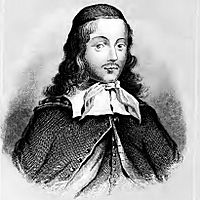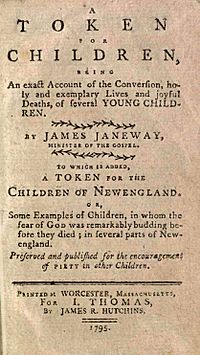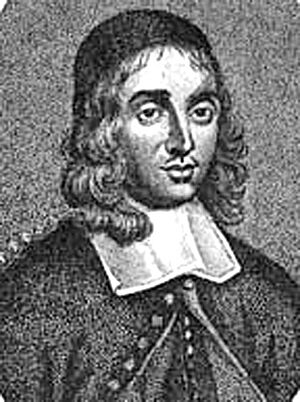James Janeway facts for kids
Quick facts for kids
James Janeway
|
|
|---|---|

Puritan minister and author
|
|
| Born | 1636 Lilley, Hertfordshire, England
|
| Died | 1674 London, England
|
James Janeway (1636–1674) was an English Puritan minister and writer. He became one of the most popular authors for English-speaking children, second only to John Bunyan.
Early Life and Work
James Janeway was born in Lilley, Hertfordshire, England, in late 1636. His father, William Janeway, was also a minister. James studied at Christ Church, Oxford, and earned his B.A. degree.
Like many Puritans, he worked as a private tutor for a time. In 1662, a law called the Act of Uniformity 1662 forced many ministers, including Janeway, to stop preaching in official churches. They became known as "ejected" or "silenced" ministers.
Challenges and Popularity
Janeway began preaching as a non-conformist in 1665, during the terrible Great Plague of London. He also witnessed the Great Fire of London in 1666, another major disaster.
By 1672, his followers built a large meeting house for him near London in Rotherhithe. Many people came to hear him speak, and it was said that:
he had a very numerous auditory, and a great reformation was wrought amongst many.
However, Janeway's popularity caused problems with the Church of England. They even tried to shoot him at least twice. Once, a bullet went through his hat but missed him! Soldiers destroyed his preaching building, but his congregation simply built an even bigger one to hold everyone who wanted to hear him.
Later Life and Legacy
James Janeway suffered from melancholy and became sick with tuberculosis. He died at the age of 38. Sadly, all five of his brothers also died from tuberculosis before they turned 40. He was buried next to his father in St Mary Aldermanbury churchyard.
Janeway is best known for his book, A Token for Children. In this book, he shared true stories of children who had found faith under his guidance. In the introduction, he asked parents:
Are the souls of your children of no value? They are not too little to die.. not too little to go to hell.. not too little to serve their great Master, not too little to go to heaven.
This book became a very important tool for sharing Christian messages. It was one of the most widely read books in English homes, after the Bible and Pilgrim's Progress by John Bunyan. The American preacher Cotton Mather admired it so much that he wrote his own version called A Token for the Children of New England.
Janeway also wrote other works, including "Upon Earth: Jesus, The Best Friend in the Worst Times." His ideas continued to influence Puritan thinkers long after his death. Even Charles Haddon Spurgeon, a famous preacher in the late 1800s, often mentioned Janeway's writings in his sermons.
Published Works
- Heaven upon Earth; or the Best Friend in the Worst Times, 1670
- A Token for Children; In two parts, 1671
- Death Unstung; a Funeral Sermon for Thomas Mousley, an Apothecary
- Invisible Realities, demonstrated in the holy Life and Death of Mr. John Janeway, 1673.
- The Saints' Encouragement to Diligence in Christ's Service, 1673
- Legacy to his Friends; containing 27 famous Instances of God's providence in and about sea dangers and deliverances, 1674
- Saints' Memorials, 1674, edited by Edmund Calamy, Joseph Caryl and Ralph Venning
- The Duties of Masters and Servants; a Sermon in supplement to Morning Exercises, 1674
 | Sharif Bey |
 | Hale Woodruff |
 | Richmond Barthé |
 | Purvis Young |



